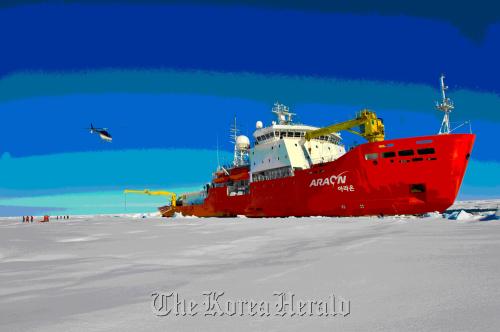Korea has secured support from Norway and Finland in its bid to become a permanent observer to the Arctic Council, a multinational forum on energy, shipping, exploration and other crucial issues in the North Pole region.
Korea has been striving to boost its presence in the Arctic as global powers jockey to take advantage of its huge resources, strategic location and new key sea routes opening up with the rapidly melting ice sheets.
“Norway and Finland have been very active in working with us. They have no problem (having Korea as a permanent participant),” Shin Maeng-ho, director general of international legal affairs at the Foreign Ministry, told The Korea Herald.
 |
Korean icebreaker Araon is docked at a sea ice station in the Arctic. (Ministry of Land, Transport and Maritime Affairs) |
Their support raises hopes for Korea in gaining permanent observer status at the next council meeting in Sweden, the current chair, in 2013.
About 40 countries and international organizations including the EU, China, Italy and Japan are applying for an observer position currently.
Last week, Shin met with Karsten Klepsvik, Norway’s ambassador to the Arctic Council, to discuss Korea’s membership, joint research projects and related policies.
The country has also been expanding collaboration with Finland, focusing on the shipbuilding, engineering and marine sectors.
“I would be surprised if (Korea) could not gain the honor,” Klepsvik said in a recent interview with The Korea Herald.
“Having said that, participation in the Arctic Council has become more complicated than it was in the outset. But I cannot see any reasons why we should not be able to agree on Korea’s application.”
The ambassador’s remarks reflect an ever-intensifying race, for which sovereignty is not yet fully defined.
The intergovernmental forum was established in 1996 to address the region’s environmental, development, tribal and other issues. Its five other members are the U.S., Canada, Russia, Iceland and Denmark.
Permanent observer states are France, Germany, the Netherlands, Poland, Spain and the United Kingdom.
In 2008, Korea became an “ad hoc” observer. Its application for permanent status was previously declined. Shipping lanes are currently emerging as a key geopolitical topic, triggering territorial disputes.
Other ad-hoc observers are China, the European Union, Italy and Japan.
By Shin Hyon-hee (
heeshin@heraldcorp.com)





![[Exclusive] Hyundai Mobis eyes closer ties with BYD](http://res.heraldm.com/phpwas/restmb_idxmake.php?idx=644&simg=/content/image/2024/11/25/20241125050044_0.jpg)
![[Herald Review] 'Gangnam B-Side' combines social realism with masterful suspense, performance](http://res.heraldm.com/phpwas/restmb_idxmake.php?idx=644&simg=/content/image/2024/11/25/20241125050072_0.jpg)

